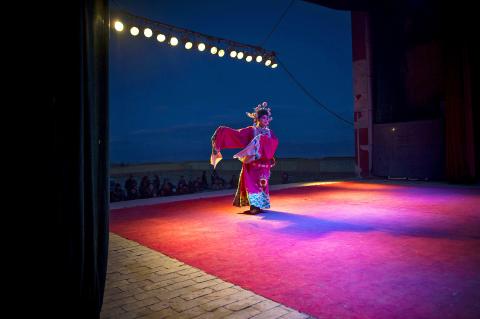For the 50-year-old Chinese opera performer, every aspect of the dimly-lit backstage room was a reminder that things had changed.
The elaborate costumes carelessly thrown aside, the young troupe members playing with their smartphones, the half-eaten noodles abandoned in the corner — all were tokens of disorder that made Li Zhiguo grimace in his blue and gold cap.
“I get angry sometimes watching my students perform, because their heart isn’t in it,” Li said. “But when they ask me if rehearsing diligently will guarantee them a good living, I have nothing to say.”

Photo: AFP/Wang Zhao
When Li joined the Yu County Jin Opera Troupe in Hebei Province 35 years ago, he and his fellow teenage recruits believed that they had secured stable futures as the public guardians of a traditional art.
But policy reforms in 2005 turned their government-sponsored project into a private venture without a concrete business strategy, gutting the performers’ salaries and threatening the future of an early Qing Dynasty opera form.
Jin opera, which is characterized by upbeat songs and wooden clapper instruments, originated in the Shanxi Province bordering Yu County.

Photo: AFP/Wang Zhao
From the Spring Festival to the end of March, the troupe travels from village to village in Hebei, performing on ramshackle rural stages to mostly elderly crowds.
Despite their new business designation, they still rarely charge for performances — most attendees wouldn’t pay — and rely heavily on support from local governments.
Backstage at one of their last shows of the season, Li sighed as he recounted all the departures in recent years. Many of his students had left the troupe after struggling to support their families.
“If it’s about the art, I’ll tell them to stay,” said Li. “If it’s about survival, I’ll tell them: go.”
AN ‘IRON RICE BOWL’ NO MORE
The group of 90 has been active since 1985, drawing its members from auditions held across Yu County. The performers join when they are between 13 and 15 years old; those who stay have known each other their entire adult lives.
Liu Donghai, a former actor who now helps manage the troupe, recalled that being chosen from among more than a thousand kids had felt like winning the lottery.
His parents were thrilled because, being a state institution at the time, the troupe offered him an “iron rice bowl” — the Chinese parlance for a secure job.
However, since they were stripped of their public status, some performers have started driving pedicabs between shows for supplementary income.
Even the most senior members of the troupe make less than 2,500 yuan (US$363) a month, while the average actor makes closer to 1,500 yuan (US$217) in a district where the minimum monthly wage is 1,590 yuan (US$231).
Over the 23 years that Liu, 36, has been with the group, he has seen his cohort shrink, but a sense of loyalty has kept him from leaving.
“This is my family,” he said. “Our troupe leader is like a father to me. Whatever he says, I’ll do.”
Sometimes that means singing in negative degree Celsius weather, or dancing while snow settles on his elaborate costumes.
But as Geng Liping, a 30-year-old actress, said, “When you’re on stage you never feel cold.”
‘Sword DANGLING OVER THEIR HEADS’
Jin opera recounts ancient Shanxi history, with storylines soaked in nostalgia for the province’s imperial past. Modern audiences have different tastes, said Wang Jia, founder of the China Jin Opera Network.
“Even our notion of beauty has changed, so everything — from the costumes to the dialogue — is being adapted for contemporary viewing,” Wang said. The greatest problem they face now is attracting young recruits willing to endure the nomadic life of an actor, a life without financial guarantees.
“Most of them don’t have health insurance,” Wang said. “The question of whether their basic needs will be met is like a sword dangling over their heads.”
At a March performance in Yu County’s Baocao Village, there were no chairs in the viewing area, but some attendees had brought their own. Others watched from inside their cars, or found perches along a crumbling brick fence as a harsh wind blew around them.
More people used to come, the performers said, before the county’s coal plants closed and the migrants left.
Now there were about 50 mostly elderly locals, some with babies in their arms. They heard about the show through word of mouth.
One of the few young people, 20-year-old Zhang Zehui, had attended several performances with her grandmother.
“It’s lively and interesting, but I don’t really understand it,” Zhang said.
Garbed in a colorful robe, Li stood backstage, awaiting his cue.
“Has it been worth it?” he asked as he looked out at the crowd. “That’s a big question mark in my heart.”

May 11 to May 18 The original Taichung Railway Station was long thought to have been completely razed. Opening on May 15, 1905, the one-story wooden structure soon outgrew its purpose and was replaced in 1917 by a grandiose, Western-style station. During construction on the third-generation station in 2017, workers discovered the service pit for the original station’s locomotive depot. A year later, a small wooden building on site was determined by historians to be the first stationmaster’s office, built around 1908. With these findings, the Taichung Railway Station Cultural Park now boasts that it has

The latest Formosa poll released at the end of last month shows confidence in President William Lai (賴清德) plunged 8.1 percent, while satisfaction with the Lai administration fared worse with a drop of 8.5 percent. Those lacking confidence in Lai jumped by 6 percent and dissatisfaction in his administration spiked up 6.7 percent. Confidence in Lai is still strong at 48.6 percent, compared to 43 percent lacking confidence — but this is his worst result overall since he took office. For the first time, dissatisfaction with his administration surpassed satisfaction, 47.3 to 47.1 percent. Though statistically a tie, for most

Six weeks before I embarked on a research mission in Kyoto, I was sitting alone at a bar counter in Melbourne. Next to me, a woman was bragging loudly to a friend: She, too, was heading to Kyoto, I quickly discerned. Except her trip was in four months. And she’d just pulled an all-nighter booking restaurant reservations. As I snooped on the conversation, I broke out in a sweat, panicking because I’d yet to secure a single table. Then I remembered: Eating well in Japan is absolutely not something to lose sleep over. It’s true that the best-known institutions book up faster

In February of this year the Taipei Times reported on the visit of Lienchiang County Commissioner Wang Chung-ming (王忠銘) of the Chinese Nationalist Party (KMT) and a delegation to a lantern festival in Fuzhou’s Mawei District in Fujian Province. “Today, Mawei and Matsu jointly marked the lantern festival,” Wang was quoted as saying, adding that both sides “being of one people,” is a cause for joy. Wang was passing around a common claim of officials of the People’s Republic of China (PRC) and the PRC’s allies and supporters in Taiwan — KMT and the Taiwan People’s Party — and elsewhere: Taiwan and